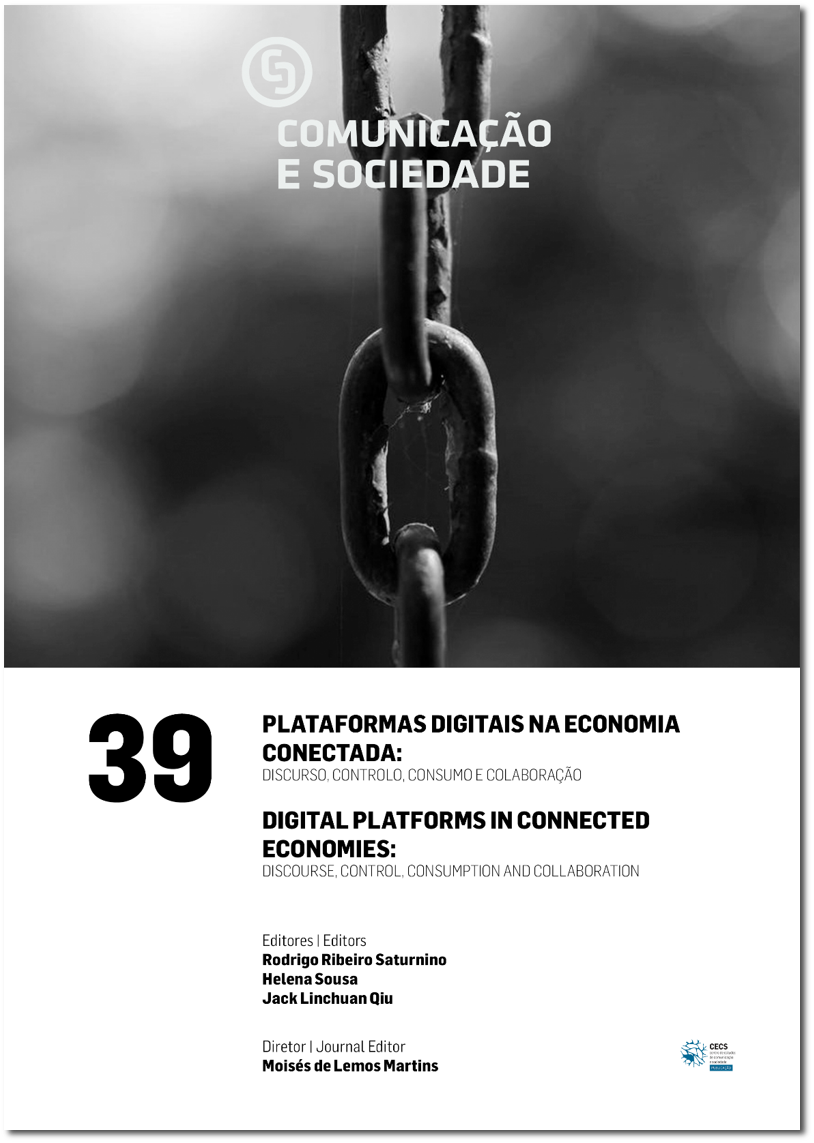The Black Social Ranking Experience at Uber: A Racialized Reflection on Contemporary Surveillance
DOI:
https://doi.org/10.17231/comsoc.39(2021).2838Keywords:
social ranking, Uber, racism, surveillanceAbstract
This study analyzes the social ranking experience of Black users and drivers of the private transportation company Uber in the city of Rio de Janeiro, Brazil. With the attention turned to the experience and evaluation system of the company, it is observed how they appear in the contemporary logic of surveillance. Based on discussions and observations carried out in exploratory research, the study asks: with data surveillance mechanisms in operation, how are Black people experiencing the social logic of ranking in Uber’s environment? Cartography was the methodology chosen for the study, considering the possibility of monitoring processes and their commitment to experimentation — with flexible data production procedures — as well as its research-intervention nature (Escóssia et al., 2009). Thus, the main objective of the research was to investigate this experience in order to broaden the analysis of contemporary surveillance with a racialized approach; and among the specific objectives, we aim at breaking the silencing and invisibility of Black theoretical perspectives (Ribeiro, 2017). The theoretical framework of the study will be divided into two study axes: race relations and surveillance. It is therefore realized that, in the era of big data, discrimination can appear in a hidden way as technologies perform a false neutrality that accelerates and deepens it (Benjamin, 2019).
Downloads
References
Akotirene, C. (2019). Interseccionalidade. Sueli Carneiro; Pólen.
Almeida, S. (2018). Racismo estrutural. Letramento.
Amaral, F. (2016). Introdução a ciência de dados: Mineração de dados e big data. Alta Books.
Benjamin, R. (2019). Race after technology. Polity Press.
Borges, J. (2019). Encarceramento em massa. Sueli Carneiro; Polén.
Braga, R., & Evangelo, N. (2017). Meeoo, isso é muito Black Mirror: A nota da Uber como punição do comportamento social na sociedade da vigilância distribuída. In Anais do XXVI COMPÓS – Associação Nacional dos Programas de Pós-Graduação em Comunicação (pp. 1-17). http://www.compos.org.br/data/arquivos_2017/trabalhos_arquivo_QB5FBIXWGP5D1KD0YBID_26_5808_21_02_2017_14_46_40.pdf
Browne, S. (2015). Dark matters: On the surveillance of blackness. Duke University Press.
Bruno, F. (2013). Máquinas de ver, modos de ser: Vigilância, tecnologia e subjetividade. Sulina.
Deleuze, G. (2013). Conversações (P. P. Pelbart, Trad.). Editora 34.
Escóssia, L., Kastrup, V., & Passos, E. (2009). Apresentação. In E. Passos, V. Kastrup, & L. Escóssia (Eds.), Pistas do método da cartografia: Pesquisa-intervenção e produção de subjetividade (pp. 7–16). Sulina.
Foucault, M. (2014). Vigiar e punir: Nascimento da prisão (R. Ramalhote, Trad.). Vozes. (Trabalho original publicado em 1975)
FutureBridge. (2020, 14 de maio). E-hailing: Consuming mobility-as-a-service. https://www.futurebridge.com/uncategorized/e-hailing-consuming-mobility-as-a-service/
Ghedin, R. (2019, 12 de abril). 5 Pontos para entender a operação da Uber a partir do seu pedido de IPO. Manual do Usuário. https://manualdousuario.net/uber-ipo-brasil/
Kastrup, V. (2008). O método da cartografia e os quatro níveis da pesquisa-intervenção. In L. R. de Castro & V. L. Besset (Eds.), Pesquisa-intervenção na infância e juventude (pp. 465–489). Trarepa; FAPERJ.
Kastrup. V., Passos, E., & Tedesco. S. (2014). Pistas do método da cartografia: A experiência da pesquisa e o plano comum. Sulina
Kilomba, G. (2019). Memórias da plantação: Episódios de racismo cotidiano (N. Quintas, Trad.). Editora Cobogó. (Trabalho original publicado em 2008)
Lyon, D. (2015). Surveillance after Snowden. Polity Press.
Mahmoudi, D., O’Sullivan, D., & Thatcher, J. (2016). Data colonialism through accumulation by dispossession: New metaphors for daily data. Environment and Planning D, Forthcoming, 34(6), 990–1006. https://doi.org/10.1177/0263775816633195
Mbembe, A. (2018). A crítica da razão negra (S. Nascimento, Trad.). N-1 Edições. (Trabalho original publicado em 2013)
Plunkett, J. (2015, 8 de setembro). Netflix set to make new series of Charlie Brooker’s dystopian drama Black Mirror. The Guardian. https://www.theguardian.com/media/2015/sep/08/netflix-new-series-charlie-brooker-dystopian-drama-black-mirror
Ribeiro, D. (2017). O que é lugar de fala. Letramento.
Serviço de caronas remuneradas Uber inicia operações no Brasil. (2014, 27 de maio). O Globo. https://oglobo.globo.com/economia/tecnologia/servico-de-caronas-remuneradas-uber-inicia-operacoes-no-brasil-12618444
Uber. (s.d.). Quem somos. https://www.uber.com/br/pt-br/about/
Wright, J. (Diretor). (2016). Nosedive (Temporada 3, Episódio 1) [Episódio de série de TV]. In C. Brooker (Produtor Executivo), Black mirror. Zeppotron; Channel 4 Television Corporation; Babieka.
Zuboff, S. (2018). Big other: Capitalismo de vigilância e perspectivas para uma civilização de informação. In F. Bruno, B. Cardoso, M. Kanashiro, L. Guilhon, & L. Melgaço (Eds.), Tecnopolíticas da vigilância – Perspectivas da margem (pp. 17–68). Boitempo.
Downloads
Published
How to Cite
Issue
Section
License
Copyright (c) 2021 Comunicação e Sociedade

This work is licensed under a Creative Commons Attribution-NonCommercial 4.0 International License.
Authors own the copyright, providing the journal with the right of first publication. The work is licensed under a Creative Commons Attribution 4.0 International License.












